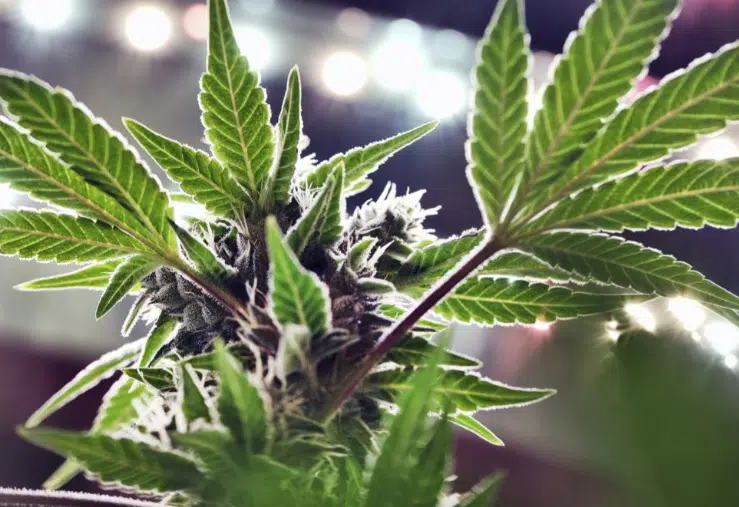
MOORHEAD, Minn. (KFGO) – In light of new and proposed laws regarding marijuana and THC in Minnesota and North Dakota and questions about the impact the new rules will have on business, criminal justice, and state coffers, the Fargo-Moorhead Chamber convened a panel Wednesday to discuss the implications of legal THC and marijuana with key stakeholders and experts on the topic.
Prior to July 1, THC edibles were illegal in Minnesota, but the state legislature passed a bill that approved their sale and use – which came as a surprise to some legislators, including a number who voted for it.
Rebecca Kanninen is a partner at Lockridge Grindal Nauen and a leads a St. Paul-based lobbying and advocacy firm.
“It was definitely a defined strategy, there were many legislators involved, there’s lots of quotes from legislators saying ‘we just legalized adult use,’ – they knew it. It wasn’t something that just got slipped into conference committee at the end of the day – but it was done in a very surgical way. All 201 legislators didn’t necessarily pay attention to the conversation,” Kanninen said of the Minnesota bill.
But, Kanninen says, “we did it backwards.”
“We have weak regulatory guidelines…honestly right now all we have is ‘as long as it doesn’t look like candy you can sell it.’ We joke about it but it’s true: people are selling the edibles in the church parking lot after church. It’s everywhere. It’s been wild,” she said.
Kanninen says creating a stronger regulatory framework has to be a major discussion in the next legislative session as a result.
Randy Christianson is the president of Fargo-based Beverage Wholesalers, Inc., which does business on both sides of the Red River. Christianson said many businesses are opting to not get involved in the sale of THC products at all given the unstable regulatory atmosphere and mismatched federal and state laws. But legal cannabis advocate David Owen says, at least as far as the latter is concerned, businesses shouldn’t worry.
“President Trump, President Obama, and President Biden all universally agreed during their terms to not enforce the federal laws on dispensaries and manufacturers in states where cannabis is legal, so long as they’re operating within the legal framework of that state. We’ve seen that now as an overarching federal policy for nearly 14 years. It’s not going anywhere,” Owen said.
Currently the private possession and sale of marijuana is illegal in North Dakota. This November, voters will have a chance to vote on Measure 2, which if passed would legalize both.
Owen is also the head of New Approach North Dakota, the sponsoring committee for Measure 2. He said the current effort to legalize adult-use of cannabis is the continuation of years of work.
“What we like to say is: this (Measure 2) is restricted, regulated, and controlled legal marijuana,” Owen said.
State Representative Shannon Roers Jones of Fargo’s District 46 said that in 2018 there was another measure on the North Dakota ballot to legalize pot which she described as “a free-for-all” – too broad and far-reaching.
After that measure failed to pass, Owen and other legalization advocates worked with the state legislature on HB 1420, which offered protections for employers and had input from the state’s Heath and Human Services department, garnered more support and even passed the North Dakota House, but it failed in the state Senate. The current Measure 2 is a slightly-modified version of the House bill.
Christianson is concerned about the potential impacts of legalization for business and complying with differing state and federal laws. He said, for example, that new federal rules for getting a commercial drivers license (CDL) mandate a negative drug test. He said businesses are also concerned about workforce safety, especially as it relates to heavy equipment operation, and how marijuana and related products will be taxed.
“It (legalization) makes it more difficult, probably, to hire and maintain employees,” he said.
Christianson said business could use some help in figuring out how to operate in a legalization climate, such as: “Regulation support to develop a fast and accurate test for marijuana intoxication, and to maintain the ability for employers to find remedies for workforce impairment and allow for the testing of employees for substance use prior to and after hiring, so employers aren’t left in a difficult position,” he said.
Owen said there are a number of tests that can determine marijuana use – within as few as two hours via a saliva test, urine tests which tests for consumption in the previous 1-2 days, blood tests that test usage within the previous week, and hair tests that show use in the last 30 days. He says businesses can set whatever drug enforcement policy they want for their employees under the proposed Measure 2.
“Businesses have the ability to determine: what level are we okay with? If it’s no level – like in the CDL case, it has to be no level, so that’s fine,” he said. “But if you want to say ‘on the weekends it’s fine,’ you can use a urine test.”
Roers-Jones agreed that Measure 2 is a better option and addresses many of Christianson’s concerns.
“This has a lot more protections in place for business owners. We have a construction company with employees who operate heavy machinery – I imagine we would continue to have a zero tolerance policy for those employees if this were to pass,” she said.
As for potential tax revenue that would come into North Dakota should Measure 2 pass, Owen says the fiscal note that accompanied it assumed zero dollars of sales or state revenue because Tax Commissioner Brian Kroshus did not feel comfortable estimating a market size for legal marijuana. New Approach advocates say three other estimates they’ve looked at project between $5-15 million in state revenue annually.




Shannon Roers Jones had some great comments. Her family owns Roers construction and she said it won’t have any impact. She said they will simply keep the zero tolerance rules they have in place for people who use heavy machinery.
I might add there is a federally funded study from 2001 that shows legal states have seen a decline in workers comp claims
https://www.marijuanamoment.net/legal-marijuana-states-see-reduced-workers-compensation-claims-new-study-finds/?fbclid=IwAR3ISD33Kfqs2K4KENthJ0L7Uavb_7RC-FgYkJirCKj9BldwEYN5rpBcfOU